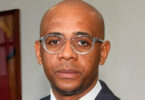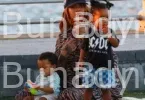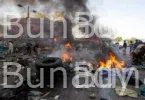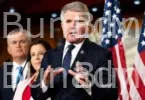Israel claims it has killed a top Hezbollah commander in a strike on a southern suburb of Beirut, Lebanon’s capital.... CLICK TO READ THE FULL NEWS HERE▶▶
The explosion in Dahiyeh, a Hezbollah stronghold, resulted in at least one death and several injuries.
The Israeli military stated that Fuad Shukr was the target of an “intelligence-based elimination” carried out by fighter jets. Officials allege Shukr was behind a rocket attack on the Israeli-occupied Golan Heights on Saturday, which killed 12 people, mostly children. Hezbollah has denied involvement in that attack.
Lebanese Prime Minister Najib Mikati condemned the strike as “blatant Israeli aggression” and a “criminal act” that violated international law by killing civilians.

Israeli Defence Minister Yoav Gallant stated on social media that “Hezbollah crossed the red line.”
It remains uncertain if Fuad Shukr was killed in the attack. Security sources in Beirut reported that the intended target was not in the building, and Hezbollah has yet to make a statement.
An Israeli official confirmed to CBS News, the BBC’s US partner, that Israel informed the US of its strike on Beirut.
Fuad Shukr is believed to be a senior advisor to Hezbollah leader Hassan Nasrallah, according to the US, which has offered a $5 million reward for information about him. He is also alleged to have played a “central role” in the 1983 bombing of a US Marines barracks in Beirut, which killed 241 US military personnel.
Haret Hreik, the area of Dahiyeh hit by the airstrike, is densely populated and heavily fortified with Hezbollah checkpoints.
Following the Israeli strike, White House press secretary Karine Jean-Pierre stated that US President Joe Biden believed a wider war between Israel and Hezbollah could be avoided.
“We do not want to see an escalation, we do not want to see an all-out war,” she said.
Earlier in the day, two unnamed Israeli officials told Reuters news agency that while Israel sought to hurt Hezbollah, it did not want to drag Lebanon into all-out war.
The Israeli Defense Forces (IDF) later said there would be no new instructions for Israelis on taking shelter, suggesting they did not anticipate an immediate or significant Hezbollah reaction.
Both sides are aware of the cost of all-out war, which could bring in Iran in support of its Lebanese proxy.
An Israeli reaction had been widely expected after the deadly attack in the Israeli-occupied Golan Heights on Saturday, and Israel’s security cabinet had authorized Mr. Netanyahu and Mr Gallant to decide how to retaliate.
At least 12 people were killed – mostly children – when a rocket hit a football pitch in Majdal Shams on Saturday.
Israel has blamed Hezbollah, but the group denies any involvement.
It was the deadliest incident near the Israel-Lebanon border since hostilities between Israel and Hezbollah escalated in October.
That escalation came after Hamas attacked Israel on 7 October.
Hezbollah – which supports Hamas – opened up a limited second front in Israel’s north, and the two sides have been exchanging fire ever since.
Recent days have seen world leaders urge restraint over fears of an all-out war.
On Tuesday the UK foreign secretary told UK nationals in Lebanon to leave immediately or risk “becoming trapped in a warzone”.
David Lammy has arrived in Qatar along with Defence Secretary John Healey “to “drive forward efforts to bring the conflict in Gaza to an end and to press for de-escalation in the region”, the Foreign Office said.
He said escalation and destabilization were “in no one’s interests”, adding: “It is vital that we engage closely with partners like Qatar, who play a key role in mediating the conflict in Gaza so that we can bring this devastating war to an end.”











